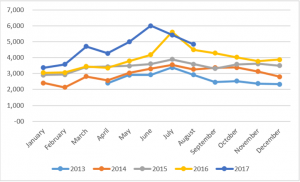
By Ciaran O’Brien
It would be a fallacy to deny that the EU Referendum has created rifts across the United Kingdom. Whilst there was and continues to be a strong appetite in certain parts of the media and political spectrum to perpetrate and exaggerate these divisions, it is true that some divisions run deep, and Brexit has seemingly unleashed a huge increase in intolerance. Towards the end of 2017, the Home Office released new hate crime statistics which showed that the UK had seen a sharp increase in reported hate incidents in the year 2016-2017, coming as no surprise to many.
A continuing rise in the number of aggressive incidents linked to islamophobia, racism, homophobia, anti-Semitism and other forms of intolerance sadly show no signs of abating (see graph below showing annual increases in Hate Crime – Home Office 2017). Our society is becoming increasingly splintered. And yet, whilst there are many saddening and sickening incidents taking place across the UK, with reports of physical and verbal abuse happening on a regular, if not daily basis, there is cause to be hopeful.

All across the UK there are initiatives seeking to break down barriers and divisions between people, bring communities together, challenge misconceptions and stereotypes, and foster greater dialogue and cooperation between those of different faiths and cultures.
This is where many interculturalists may have a much stronger role to play. There is a wealth of intercultural understanding out there, not just about culture as a concept, but about how people from different backgrounds can better understand each other, work together, and find commonalities on which to build and foster relationships. Whilst much of this knowledge is often imparted in corporate contexts through training or consulting, new opportunities may lie in community development, at a time when it is sorely needed.
Join us on Wednesday 18th April from 18:30 to 20:30 in London where we will:
• Present relevant intercultural theories and apply it to a community development context
• Examine examples of how these can be successfully applied to grassroots community projects and initiatives
• Discuss whether these growing societal challenges present intercultural trainers and consultants with new professional opportunities
• Hear from a panel of special guest contributors followed by a Q&A session
We would love you to join us, so click here to get your tickets today!
